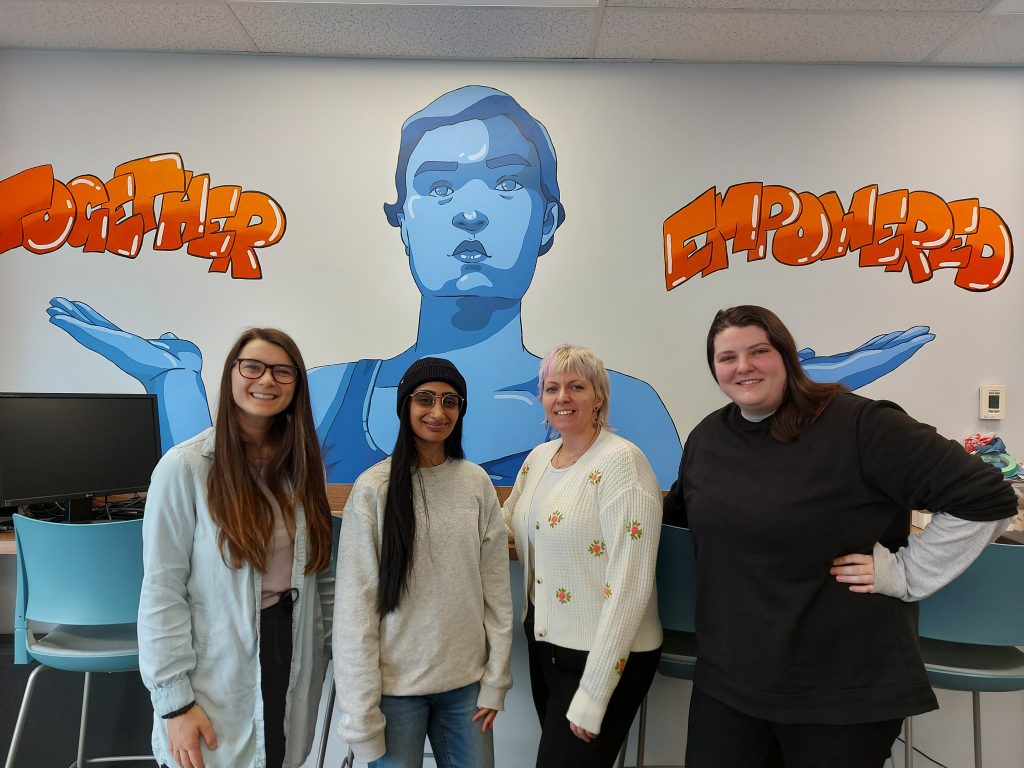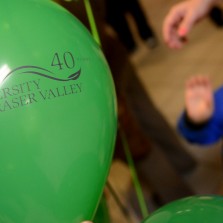UFV’s CHASI Hub
Creating safe spaces in the community and on campus through research.
For Carlanna Thompson, working at the Community Health and Social Innovation Hub (CHASI) is a dream come true. As a history honours graduate from 2022, she now has the opportunity to work as a researcher making a difference in her community.
“It’s really cool that we solve community problems,” says Thompson. “All of our projects are brought to us by the community. A lot of people finish their time at UFV, and they want to leave, they want to go work in other cities. But, if everyone leaves and no one stays to help better this community, where does that leave us? So, I think it’s important that we’ve assembled this group of students and staff that are really committed to improving the communities that we live in.”

Pictured above from left to right: Chelsea Klassen, Imran Tatla, Frankie Fowle, and Carlanna Thompson.
Thompson is not the only alum working for CHASI. Her colleagues include Imran Tatla (BA ’22), Chelsea Klassen (BA GDS ’19), student research assistant Frankie Fowle, and many others, nearly all of whom are women.
The CHASI research hub is a recent addition to UFV, one where people work hard to provide insight and strategy to the community to foster growth. Community organizations typically approach the hub with research requests, and one of the staff researchers will take on the task.
The organization is led by director Dr. Martha Dow, whose work continues to inspire those around her.
“I’ve never been in a work environment where there’s been so many female voices, and where it’s been so female led and directed,” says Thompson. “And obviously under Martha, she’s been a real figure for standing up in the community, too, when there’s gendered problems or issues of inequality.”
“It’s been amazing learning from Martha,” says Tatla. “That leadership has been really empowering, seeing how she takes initiative. As someone early on in her career, speaking about myself, learning how to take initiative and taking up space is not something I’m really comfortable with yet. So, learning or seeing how she does that — not only Martha, but Chelsea, anyone from CHASI — provides great insight.”
In essence, the CHASI space has become a home to these students and researchers, where they have found the opportunity to grow in their careers. But this safe space is not just for women. The office, with its diverse voices and perspectives, strives to make its research as equitable as possible.
“We are very mindful of incorporating as many voices in a community as possible. Be it gender, background, ethnicity, sexuality,” says Klassen. “And that’s one of the most beautiful parts of doing the research. Every time I do an interview for our work on the 2021 flood, there’s always something that I would never have thought of. I just love hearing those different things. That’s a meaningful and concrete way that we can promote equity is actively including those voices.”
“I think we all feel that if there’s an opportunity to give a platform to another voice, then we do,” says Fowle. “I think that it’s a priority. We have this amazing space, and we do all this amazing work, and I know for me, if I have an opportunity to highlight a different perspective or minority group, then I jump at that chance.”
The whole purpose of this centre is community relationship — Chelsea Klassen
One of the philosophies of the department is to find ways to make research more equitable as well. This looks different for every project but requires a level of strategic thought.
“It’s also about reducing barriers to participation in research. If we’re doing something with young mothers, then we need to be aware of the challenges that they face,” says Thompson. “We need to be flexible. We’re very intentional about our language, about how we set up things: in terms of time, flexibility, offering food. Anything that we think can help get people in and participating. I think, women do face more barriers in participating in research. They’re also just not asked as frequently.”
To allow these meaningful research contributions to happen, the team has to create safe spaces where these discussions can take place, especially when regarding sensitive topics.
“To be able to create that safe space and give people that opportunity to talk about what they need to talk about in a way that they feel comfortable. So, I think we need all kinds of researchers to help fill those gaps,” says Thompson.
“The whole purpose of this centre is community relationship,” adds Klassen. “So, the research is a component of that, and the main component, but a lot of the work we do is that emotional, invisible layer — is building relationships, community. And that can’t be quantified in a monetary value, it can’t really be checked off in a box. It has to be intentional. And it requires a high level of fabricating different community dynamics.
“I see our work at the Hub as relationship building,” she continues, “in that I think that that’s a great privilege and responsibility. You try to do as much justice as you can to that. But that is also such a key part of our work that can’t be ignored or forgotten.”
To learn more about CHASI and their work, visit their website.

